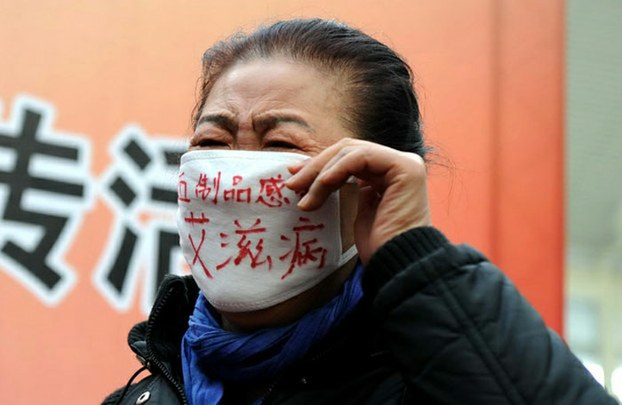Chinese lawyers call for end to HIV testing of new employees on World AIDS Day
| Publisher | Radio Free Asia |
| Publication Date | 1 December 2016 |
| Cite as | Radio Free Asia, Chinese lawyers call for end to HIV testing of new employees on World AIDS Day, 1 December 2016, available at: https://www.refworld.org/docid/5848124b6.html [accessed 21 May 2023] |
| Disclaimer | This is not a UNHCR publication. UNHCR is not responsible for, nor does it necessarily endorse, its content. Any views expressed are solely those of the author or publisher and do not necessarily reflect those of UNHCR, the United Nations or its Member States. |
2016-12-01
 AIDS activist in China's Henan province, center of a 1990s mass infection scandal, mounts a protest, in file photo. AFP
AIDS activist in China's Henan province, center of a 1990s mass infection scandal, mounts a protest, in file photo. AFP
Dozens of Chinese lawyers have penned a letter to the country's cabinet, the State Council, calling for an end to nationwide labor discrimination against people living with HIV, as the country marked World AIDS Day on Thursday.
The open letter, signed by some 60 lawyers, calls on Chinese President Xi Jinping to amend civil service recruitment guidelines to uphold the employment rights of people living with HIV.
While Xi and Premier Li Keqiang have repeatedly stressed that discrimination against people on the basis of their HIV status should be eliminated, that sentiment has yet to be implemented in the way state organizations actually hire people, letter author and Shandong-based rights lawyer Liu Shuqing told RFA.
"Discrimination against people with HIV is still very serious in China's labor market," Liu said.
While legislation prohibits discrimination against someone on the basis of HIV infection, recruitment practices have yet to comply, he said.
"Many companies also follow civil service guidelines, and this has led to the development of a variety of discriminatory practices," he said.
People living with HIV are currently barred from civil service jobs, a provision Liu said was made in the days when AIDS was still considered a death sentence, and on the basis of medical ignorance about how it is transmitted.
"Both the Law on the Prevention and Control of Infectious Diseases and the Law on Promotion of Employment, expressly prohibit discrimination on these grounds, and yet the civil service recruitment guidelines don't acknowledge these laws, which are at a higher level than them," Liu said.
"The civil service should set an example for other industries to follow," he said.
Private sector follows government
Official figures showed 654,000 people living with HIV in China at the end of September, with 201,000 deaths recorded to date, the Chinese Center for Disease Control and Prevention reported.
About 96,000 new cases were reported in the first nine months, with sharp increases in infections among younger and older males, it said.
Lu Jun, who founded the anti-discrimination group Beijing Yirenping, and who is currently studying in the United States, agreed that many other professions copy the civil service guidelines when recruiting, including teaching and healthcare.
Mandatory HIV testing is widespread in many organizations, and people found to be living with HIV are barred from working in both civil service and private sector roles, he said.
The executive authorities are themselves setting the standards for this occupational discrimination," Lu said.
"Not only does it seriously violate the rights of people living with HIV, there is no redress for them either," he said. "Whether you choose to lodge a complaint or a lawsuit, justice is very hard to come by."
Earlier this week, Premier Li said the ruling Chinese Communist Party's Central Committee and the State Council attached great importance to the prevention and treatment of HIV and AIDS.
"Intervention needs to be more efficient, testing and counseling services more accessible, public education more targeted and follow-up services improved," Li said in a written instruction to the bodies reported by the official media.
Li also ordered "across-the-board implementation" of testing, prevention of mother-to-child transmission, medical assistance and other policy measures.
Condom crackdown
Li said central government would ring-fence funding for HIV/AIDS prevention and control, drug research and development, international cooperation and greater roles for social organizations and volunteers.
But sex workers and NGOs have hit out at the government for inhibiting their efforts in preventing HIV transmission.
In July, a report showed that frequent police raids are limiting the use of condoms, because police treat the mere possession of condoms as evidence of prostitution, as part of an ongoing "strike hard" campaign.
The New York-based Asia Catalyst group published a report this week detailing the effects of widespread interrogation and searches of sex workers across China, where prostitution is a criminal offense.
It found that just 48 percent of sex workers who had been raided or interrogated by police continued to insist on condom use. The rest no longer carried them.
A nationwide crackdown on NGOs is also likely to have an impact on the role of "social organizations and volunteers."
Last April, China's parliament approved a new law requiring overseas rights groups and other nongovernmental organizations to submit to police control.
The standing committee of the National People's Congress (NPC) adopted the Overseas NGOs Domestic Activities Management Law, which enables police to engage in daily supervision and monitoring of foreign civil society and rights groups operating in China. The law goes into Jan. 1, 2017.
Reported by Gao Shan for RFA's Mandarin Service, and by Hai Nan for the Cantonese Service. Translated and written in English by Luisetta Mudie.
Link to original story on RFA website
